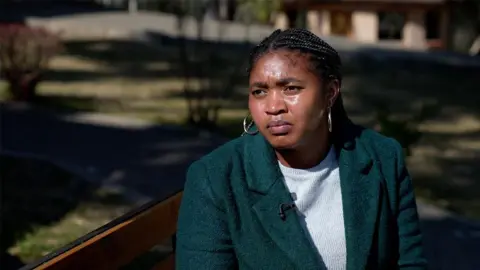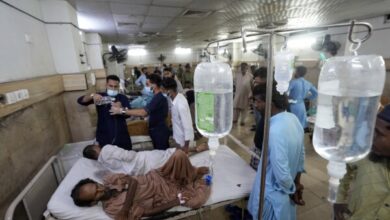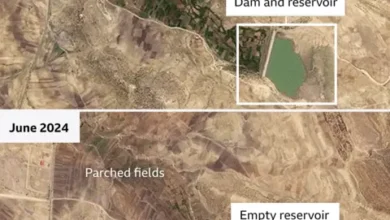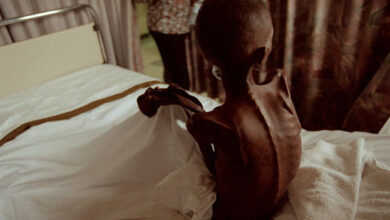
It is a steep climb from the main road to 79-year-old Matlohang Moloi’s home, through the mountains that make Lesotho one of the highest countries in the world.
The mother of 10 welcomes me to her neat house, showing me photos of her large family. I am here to talk about one of her children – her firstborn son, Tlohang.
At 38 he became part of a grim statistic. Lesotho, the kingdom in the sky, is home to the world’s highest suicide rate.
“Tlohang was a good son. He had told me about his mental health struggles,” Ms Moloi says.
“Even that day he took his own life, he came to me and said ‘mother, one day you will hear that I have taken my life’.
“His death hurt me a lot. I really wish he could have explained in more detail what was troubling him in his mind. He was worried if he told people they’d think he’s a weak person who can’t solve his own problems.”
g Moloi’s son, Tlohang, took his own life
According to the World Health Organization, 87.5 people per 100,000 of the population take their own life every year in Lesotho.
By contrast that is more than double the next country on the list, Guyana in South America, where the figure is just over 40.
It is also almost 10 times the global average, which stands at nine suicides per 100,000 people.
That is a statistic that NGOs – such as HelpLesotho – are determined to change, by equipping young people with the skills to manage their mental health.
In the town of Hlotse, about two hours’ drive from the capital, Maseru, I sit in on on one of the regular group therapy sessions for young women, run by social worker Lineo Raphoka.
“People think it’s against our African principles, our cultural experiences, against our spirituality as Africans, and as a community at large,” 24-year-old Patience tells the group.
“But we are also shying away from the fact that it is happening. I’m talking from a perspective where I’ve lost three friends from suicide, I’ve personally attempted.”
Everyone here has experienced suicidal thoughts, or know someone who has died by suicide.
Thirty-five-year-old Ntsoaki becomes emotional, as she tells the group her story of being raped in hospital.
“The doctor told me I was too attractive. Then he took out a gun and told me he wanted to have pleasure with me, and if I didn’t he would kill me.
“Every time with suicide, I always thought it was the only solution. I couldn’t do it, I had no strength to do it. The only thing that kept me moving or alive were the faces of my brothers. They believe I’m strong, but I’m weak.”
The group reassures her she is strong for sharing her feelings.
As the session finishes, all the women are chatting and smiling, saying they feel better for sharing their stories.
The reasons people take their own lives are often complicated, and it is difficult to isolate a single cause.
Despite that, Ms Raphoka says she sees patterns that explain why Lesotho has such a high suicide rate.
“Mostly they go through situations such as rape, unemployment, loss because of death. They abuse drugs and alcohol.”
According to a World Population Review report in 2022, 86% of women in Lesotho have experienced gender-based violence.
Meanwhile the World Bank says two in five young people are not in employment or education.
“They’re not getting enough support from their families, friends or any kind of relationships that they have,” Ms Raphoka continues.
It is something you often hear in Lesotho. People say time and again that they do not feel comfortable talking about their mental health – and that others might judge them.
Sitting in a bar in Hlotse one evening, where the male clientele drink local beer and chat politics while football plays on the TV, I steer the conversation towards mental health.
“We do talk about it, we say let’s open up,” Khosi Mpiti tells me.
Some are afraid that if they reveal too much they could be gossiped about. Despite this, he says things are getting better.
“As a group [of friends] we’re very supportive. If I’m having a problem I tell the group, and we support each other.”
When people do seek help though, they are confronted with a struggling public health system.
The country’s only psychiatric unit was last year criticised by the ombudsman – an official whose job it is to look after the public’s interests – for not having had a psychiatrist since 2017.
She also highlighted widespread abuses, including “living conditions that violate human rights”.
There was previously also no national mental health policy to deal with the crisis, although the government – elected in October 2022 – says it is in the process of drafting one.
“Mental health has become a pandemic,” admits Mokhothu Makhalanyane, an MP who leads a parliamentary committee that deals with health issues.
“We are making sure that advocacy is intensified, from primary school, to high schools, to places where young people gather, such as football tournaments,” he tells the BBC.
“The policy will also be specific in terms of treatment, and will allow those affected to go for rehabilitation.”
He also says Lesotho can learn from its battle against HIV/Aids.
In 2016 it became the first country to introduce a “test-and-treat” strategy, meaning people can start treatment as soon as they are diagnosed. Rates of infection have consistently fallen.
“The experience that we had is that talking openly, and not blaming or criticising the people for their situation, helped turn things around.”
Back up in the mountains, Ms Moloi takes the short walk to tend to Tlohang’s grave.
His final resting place is a plot with a stunning vista, dotted with streams, greenery and small houses.
Ms Moloi is one of many people living in Lesotho who are dealing with the grief of death by suicide.
As we take in the view, she says she has a message for those who find themselves in the same headspace as her son.
“I would tell people that taking your own life is never a solution. What you have to do is to talk to people around you so they can help you.”




